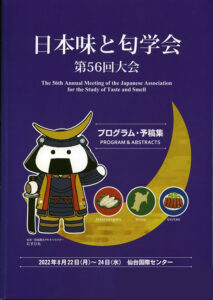概要
- 会期:2022年8月22日(月)〜24日(水)
- 会場:仙台国際センター大ホール、橘
- 大会長:坂井 信之(東北大学 大学院文学研究科・文学部)
- 懇親会:懇親会は中止となりました。
- ウェブサイト:https://jasts-sendai56.com/
プログラム
- うま味研究会協賛|Young Scientists Symposium: Challenge of Cutting-edge Chemosensory Research -Aiming for Synergy among Young Researchers-(3題)
オーガナイザー:岩槻健(東京農業大学)、安尾敏明(朝日大学)- Umami perception in birds and mammals.
Dr. Yasuka Toda (Meiji University) - Thypothalamus response to consumed macronutrients in humans.
Dr. Yuko Nakamura (University of Tokyo) - Functional brain network is altered by ingested nutrients and nutrient conditions in the body.
Dr. Tomokazu Tsurugizawa (AIST)
- Umami perception in birds and mammals.
- Asian Scientists Symposium(英語セッション)(4題)
オーガナイザー:畝山寿之(味の素株式会社)、大沼卓也(近畿大学)- Kokumi substances and bacteria involved in Thai fermented fishery products (Kapi and Pla-ra).
Dr. Suwimon Keeratipibul (Chulalongkon University (Thailand)) - Multiple effects of taste-active nutrients on taste receptors.
Dr. Mee-Ra Rhyu (Korea Food Research Institute) - COVID19-associated taste and smell dysfunctions
Dr. Eugeni Roura (The University of Queensland (Australia)) - Stress, Post-Traumatic Growth, Coping Strategies of Cyber-bullying victims during the COVID-19 pandemic in Thailand.
Dr. Nattasuda Taephant (Chulalongkon University (Thailand))
- Kokumi substances and bacteria involved in Thai fermented fishery products (Kapi and Pla-ra).
- Special Symposium on Human Eating Behaviors(3題)
オーガナイザー:坂井信之(東北大学)- Evolution of Chinese Dishes in Japan as Viewed through Cooking Texts.
Dr. Yukihiro Kawaguchi (Tohoku University) - Food consumption of the Bangkok residents: Preliminary findings from WELL Thailand project.
Dr. Nipat Pichayayothin (Chulalongkorn University) - Emotional Eating and Weight Loss Self-efficacy: The Effects of Cognitive Behavioral Group Therapy.
Dr. Kullaya Pisitsungkagarn (Chulalongkorn University)
- Evolution of Chinese Dishes in Japan as Viewed through Cooking Texts.
- シンポジウム1|「化学感覚の脳・神経機構」(5題)
オーガナイザー:乾賢(北海道大学)、村田芳博(高知大学)- Complementary information transfer on stimulus dynamics by olfactory and vomeronasal sensory neurons.
野口智弘(旭川医科大学) - Artificial innate fear-evoking odorant activates a TRPA1-Sp5/NTS-PBN pathway and induces systemic hypothermia, hypometabolism, and hypoxic resistance.
松尾朋彦(関西医科大学) - Water deprivation-active neurons in the hypothalamus induce hedonic “liking” reactions for water.
田中大介(東京医科歯科大学) - Neural circuit of salt and umami seeking behavior.
小澤貴明(大阪大学) - Visualization of odor- and taste-evoked cortical responses by in vivo optical imaging study.
溝口尚子(明海大学)
- Complementary information transfer on stimulus dynamics by olfactory and vomeronasal sensory neurons.
- シンポジウム2|「多様な生物の化学感覚受容機構」(5題)
オーガナイザー:宮崎雅雄(岩手大学)、新村芳人(宮崎大学)- 植物の害虫抵抗性のための嗅覚システム
有村源一郎(東京理科大学) - Comparative analysis of bitter taste receptors between two cyprinid species.
石丸喜朗(明治大学) - Olfaction of sea snakes and the aquatic adaptation of amniotes
岸田拓士(ふじのくに地球環境史ミュージアム) - 中生代から続く毒物への適応:哺乳類の苦味受容体の分子進化
早川卓志(北海道大学) - ヒト嗅覚受容体遺伝子の多様性
新村芳人(宮崎大学)
- 植物の害虫抵抗性のための嗅覚システム
- シンポジウム3|「味覚嗅覚障害の臨床 最前線」(5題)
オーガナイザー:三輪高喜(金沢医科大学)、庄司憲明(東北大学)、佐藤しづ子(東北大学)- 味覚障害治療における小唾液腺の重要性
佐藤しづ子(東北大学) - がん化学療法による味覚障害
庄司憲明(東北大学) - 味覚障害の治療-亜鉛補充療法とその他の治療-
田中真琴(日本大学) - 認知症による嗅覚障害に関するトピック
鈴木宏和(国立長寿医療センター) - 新型コロナウイルス感染症における嗅覚・味覚障害
三輪高喜(金沢医科大学)
- 味覚障害治療における小唾液腺の重要性
- ポスターセッション|計115題




